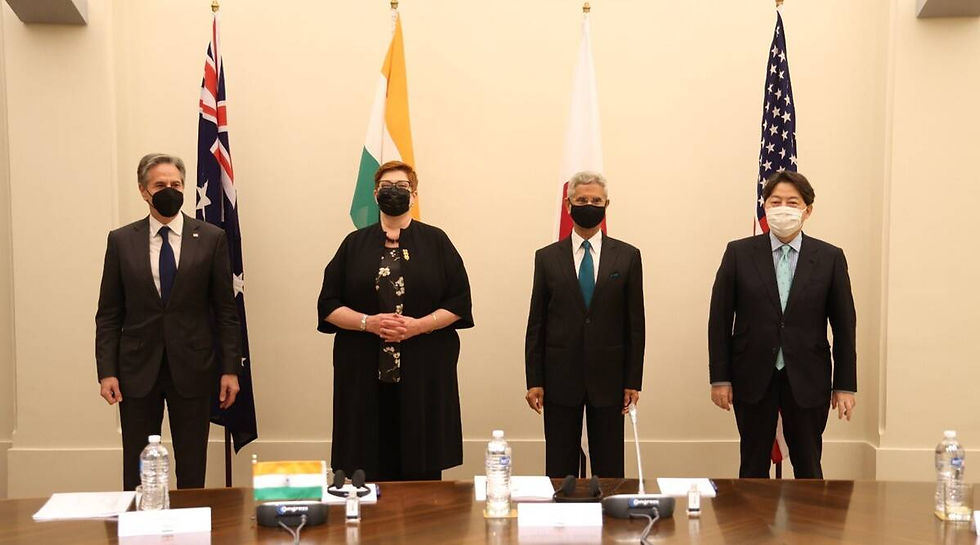
PM Modi, U.S. President Biden, and Australian PM Morrison, and Japan’s PM Kishida held their 4th quad meeting through their foreign ministers in Melbourne on 11th February 2022. External Affairs Minister Dr. S Jaishankar, US Secretary of State Antony Blinken, Australian Foreign Minister Marise Payne, and Japan’s Yoshimasa Hayashi partook in the meeting in Melbourne.
MEETING AGENDAS DISCUSSED-
1. Free and open pacific region – External Home Ministers Jaishankar to America’s Blinken, all prime diplomats of QUAD nations reiterated their decision to make sure a free and open Indo-Pacific region. Minister said, “We are together building an agenda that seeks to promote our shared vision of a free, open, and inclusive Indo-Pacific. we tend keenly to figure along to additional peace & stability & economic prosperity within the Indo-Pacific through collective efforts that address up to date issues”.
2. Tackle terror threats- The QUAD members agreed to have strong ties among the QUAD nations, the foreign ministers appeared to reinstate the group’s pledge to tackle threats in Indo-pacific. Calling for justice for the 26/11 terror attacks in Mumbai (2008) and the Pathankot airbase attack (2016), Foreign Ministers of the Australia-India-Japan said that the Quad is already cooperating on sharing intelligence on threats in the Indo-Pacific region.
3. Russia and Ukraine conflict-Russia and Ukraine were conjointly on high of the point throughout QUAD FMs meet. North American country Secretary of State Marcus Antonius Blinken called Mosco’s military build-up a challenge to the international rules-based order. inline with him, QUAD would work to preserve that order. In his gap remarks, Blinken same, “That includes championing the rights of all countries to choose their own path, free from coercion and also the right to own their sovereignty and territorial integrity, respected. whether or not that is here within the Indo-Pacific, in Europe, or anyplace else within the world”.
4.Covid-19 – The government minister of Australia, Payne, aforementioned that the group’s cooperation on the region’s COVID-19 response was “most critical”. She aforementioned that excluding the worldwide health crisis, the main focus of all four member nations was additionally on cyber and maritime security, infrastructure, climate action, and disaster relief. She additionally indicated “more than one authoritarian regime” that is “presenting itself within the current world climate as a challenge. EAM Jaishankar had additionally aforementioned in an exceedingly joint conference following the meet, “We reviewed Quad's in-progress efforts to combat COVID pandemic & in agreement to expedite delivery of safe & reasonable vaccines, support capability building & augment infrastructure for last-mile delivery.” Jaishankar had additionally hailed the collective efforts by India, the US, Australia, and Japan within the face of COVID-19.
5. China`s potshots on QUADChina has much aggressive policy over the south china sea which forms the major part of the indo- pacific ocean QUAD countries are concerned over the impact of China’s aggressive policies on the utilization of the South China ocean as the ocean is a significant world entranceway for trade. Freedom of Navigation and the necessity for rules-based order within the Indo-Pacific region are the principles being pursued by India and alternative similar powers. The Xi Jinping regime and their wolf warriors have been taking potshots at the QUAD grouping since its revival in 2017. From foreign minister Wang Yi’s flowery description of QUAD as seafoam in the Pacific or the Indian Ocean to assertive new NATO in the past, Beijing on Wednesday called it a product of Cold War mentality and a confrontational bloc against China. China has blamed the US for triggering a confrontation. The QUAD meet has totally rattled China. China considers QUAD an alliance against them. By describing QUAD as a resistance alignment, China has displayed its middle-kingdom mentality, wherever a speedily rising Beijing is at the center of the world and considers rest the rest as vassal states. It doesn't need Japan to ditch its disarmer belief despite difficult Edo on the Senkaku Islands dispute, which China considers part of their territory, even as it needs Australia to stay a docile supplier of beef, pork, cheese, and wine. just in the case of India, China has already unclothed its school of thought by attempting to unilaterally change the Line of Actual management (LAC) into (LoC). The chinas hostility amidst sanctions imposed by the USA has even led to potshots. External Affairs Minister S Jaishankar, together with his Australian counterpart by his facet, blasted the violence and standoff at the border in eastern Ladakh on China's failure to honor written agreements with India. "The state of affairs at the road Of Actual management in Ladakh has arisen because of China's disregard in 2020 of written agreements with us to not mass forces at the border," Mr. Jaishankar aforementioned on Saturday. "So, once a large country disregards written commitments, I feel it's a problem of a legitimate concern for the whole international community," he added. Speaking at a discussion in Melbourne in conjunction with his Australian counterpart Marise Payne, the minister aforementioned that the four foreign ministers of the Quad countries created a degree that "we're here to try to do positive things, to contribute to peace, prosperity, stability of the region". The Ladakh border standoff between the Indian and Chinese militaries erupted in 2020, following a violent clash within the Pangong Lake areas and each side bit by bit increased their readying by dashing in tens of thousands of troopers further as significant instrumentation.
OPINION
When China’s behavior is out of step with these issues with America, Australia, Japan, India and We stand up and defend the rule of law.” China’s assertiveness will be highly obstructive to the geopolitical development of the region. The core tenets of the Indo-pacific cooperation include freedom of navigation, the rule of law, freedom from coercion, respect for sovereignty, private enterprise, open markets, and the freedom and independence of all nations THAT IS MUTUALLY BENEFITTING FOR ALL.

Insightful